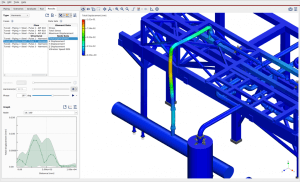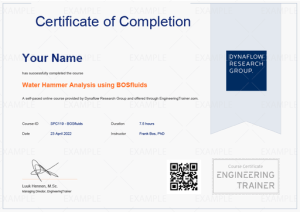
Performing Vibration Measurements: Pipe Stress Assessment
Training Courses Performing Vibration Measurements: Pipe Stress Assessment Free Course Preview Download Brochure About The Course This course teaches you all the fundamentals required for
This training seminar focuses on the latest insights into Stress Intensification Factors (SIFs), flexibility factors (k-factors), and Sustained Stress Indices (SSIs) as prescribed in the ASME B31.3 design code. Discover how to effectively implement these principles in your pipe stress analysis using FEATools. Gain an in-depth understanding of the underpinnings of recent research and explore their implications for stress assessments.
Background:
Traditionally, piping networks are modeled using beam-type approaches, with stress and flexibility calculations at discontinuities relying on empirical relationships, such as those outlined in ASME B31.3 Appendix D. While these formulas provide SIFs and flexibility factors (k’s), they come with acknowledged limitations, which can lead to either conservative or overly optimistic results depending on the situation. ASME’s Appendix D recognizes these limitations and advises engineers to seek “more applicable data” if available.
Drawing on recent analyses, research, and testing conducted by the ASME committee, particularly led by our technology partner, Paulin Research Group, this “more applicable data” is now widely accessible through ASME document STP-PT-073. This improved data is relevant for systems with large D/T ratios, sensitive or rotating equipment, cyclic operations, short or stiff thick-walled piping, or cases where the solution hinges on the SIF for a small bore connection. Implementing these updated values can yield substantially reduced stresses, potentially leading to more cost-effective designs or more realistic stress values in critical scenarios, thereby reducing the risk of failure.
FEATools, a software package developed by Paulin Research Group, integrates with CAESAR II to incorporate the “more relevant data” from STP-PT-073. The model is constructed in CAESAR II, imported into FEATools for updating SIFs and k-factors, and then exported for analysis in CAESAR II.
This intensive two-day training course empowers participants to apply the most current knowledge on SIFs and flexibility factors, offering insights into their origins, validity, and uncertainties. The course delves into the software FEATools, its interaction with CAESAR II, and provides a detailed examination of real-world case studies. Participants will become proficient in discerning the impact of the “more applicable data” statement in ASME B31.3 Appendix D on accuracy, alongside comprehending the new SIF and flexibility calculation procedures and their deviations from the standards outlined in B31.3 Appendix D
This course is available in classroom formats.
Prerequisites and level
Intended For
This course is designed for:
The classroom course is performed in person either on-site or in the Dynaflow Research Group office located in Rijswijk, The Netherlands. This course enables you to be face-to-face with the instructors with live examples provided. This course also provides all participants with a 1-year access to the self-paced course.
Exercises & software models associated with the content are available for download.
Participants of the classroom course receive a personal physical certificate upon the completion of the course.
Example certificate:

After this course, participants are expected to:

Training Courses Performing Vibration Measurements: Pipe Stress Assessment Free Course Preview Download Brochure About The Course This course teaches you all the fundamentals required for

Training Courses Piping: Structural Integrity About The Course Enhance your expertise in addressing technical challenges on a petrochemical plant. Join our introductory level ‘Piping Structural

Training Courses Pipe Stress Analysis Free Course Preview About The Course Pipe stress engineering is a broad area of expertise. To perform a pipe stress
Laan van Oversteen 20
6th floor
2289 CX Rijswijk
The Netherlands
© Dynaflow Research Group BV